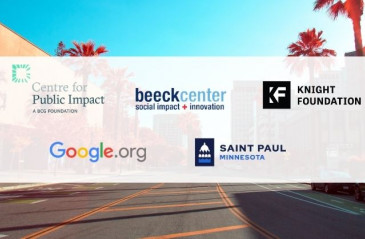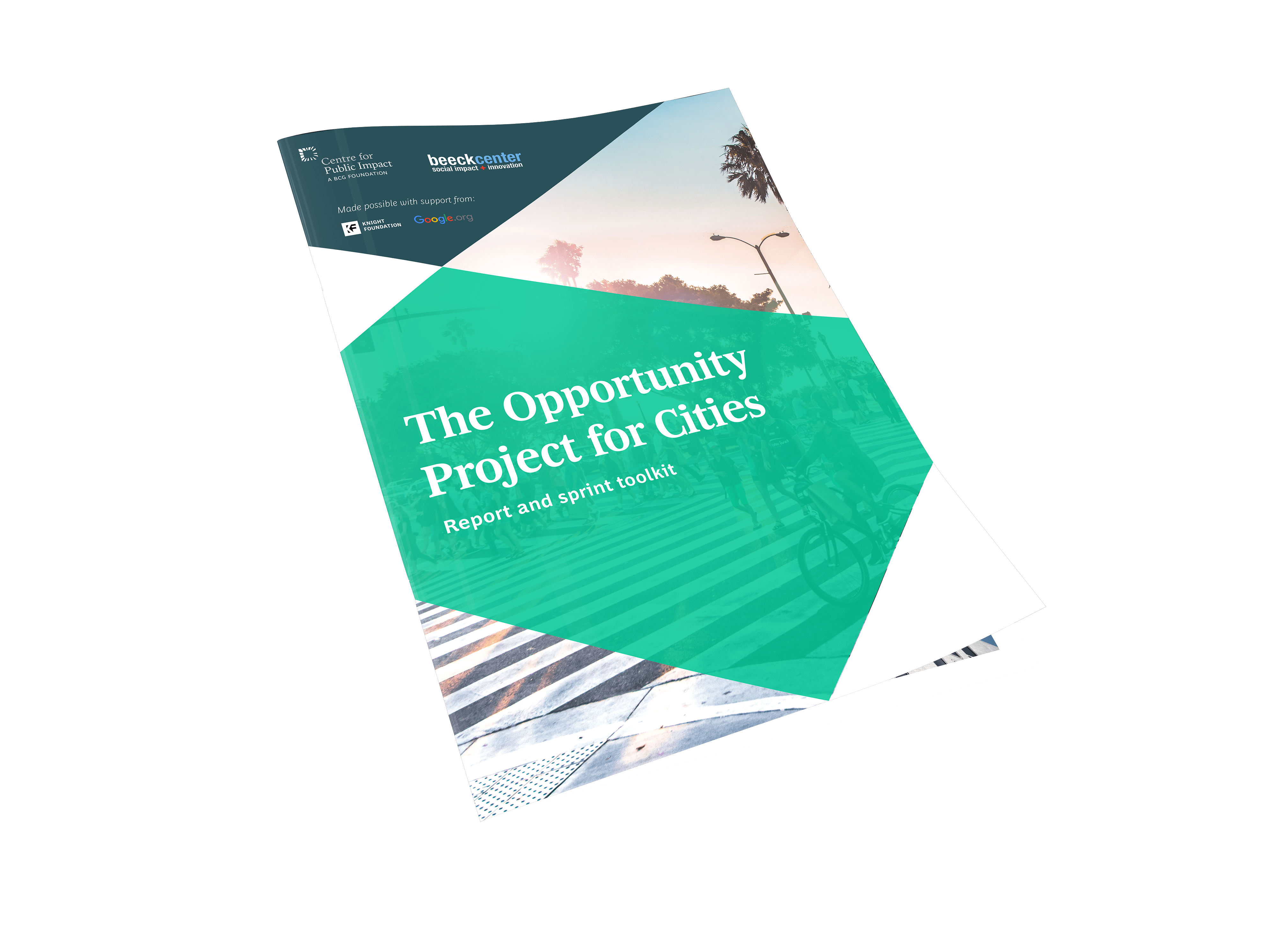
TOPcities puts residents and data at the center of building COVID-19 solutions in San José and St. Paul


.@CPI_foundation & @BeeckCenter release toolkit to encourage nationwide replication of TOPcities model used in @CityofSanJose & @cityofsaintpaul
Share article.@CPI_foundation @BeeckCenter TOPcities report details @cityofsanjose & @cityofsaintpaul 18-week sprint, during which they leveraged public data, government & community perspectives to address pressing housing challenges exacerbated by #COVID19
Share article"To address problems exacerbated by the pandemic, city govts must view innovation as a critical capability for resilience. Govts need to embrace experimentation, failure & continuous learning" @Josh_Sorin
Share articleWe put our vision for government into practice through learning partner projects that align with our values and help reimagine government so that it works for everyone.

August 19, 2021 - Washington D.C. – Today, the Centre for Public Impact (CPI) and the Beeck Center for Social Impact + Innovation at Georgetown University (Beeck Center) released The Opportunity Project for Cities (TOPcities) report. The report details San José and Saint Paul’s 18-week TOPcities sprint, during which they leveraged public data, government and community perspectives, and tech talent to build products that address pressing housing-related challenges exacerbated by the COVID-19 pandemic. In tandem, the organizations released a sprint toolkit that provides local governments step-by-step instructions to apply the TOPcities process used in San José and Saint Paul to their local context.
In San José, the TOPcities process was implemented to help the thousands of residents at risk of falling off the “eviction cliff” once federal and local COVID-19 eviction moratoria expire. Over 18 weeks, the City of San José’s Rent Stabilization Program, Catholic Charities of Santa Clara County, Google.org volunteers, and a civic tech expert used public data and insights from residents to understand how San José could best ensure residents find and obtain rental assistance.
San José’s solution, the Rental Assistance Finder - a website slated to be launched in the coming months, is designed to streamline the rental assistance process, highlight community resources to meet additional resident needs, and direct residents to in-person popup sites for further assistance. San José also worked with its partner, Catholic Charities, to set up eviction prevention popup centers throughout the city as a complement to this tool.
The City of Saint Paul, M Health Fairview, Google.org, and a civic tech expert implemented the TOPcities process to support residents experiencing homelessness. Since the start of COVID-19, Saint Paul’s rates of homelessness have increased tenfold. This increase, combined with limited non-profit serving capacity due to social distancing requirements, placed a tremendous strain on the system and left residents struggling to access essential resources like shelter and counseling.
During the TOPcities sprint, the city team worked with providers and residents experiencing homelessness to better understand how they could connect with the services they need. Saint Paul’s final product will be a custom version of ShelterApp, a centralized platform for unsheltered residents to search and learn more about the essential services that they need, when they need them. The city team is currently working on expanding the app’s reach in Saint Paul and building the ability for users to book shelter beds directly on the app.
A core tenet of TOPcities is operating in the open. In this spirit, CPI and the Beeck Center’s comprehensive toolkit provides local government leaders with step-by-step instructions to run a TOPcities sprint in their communities.
Following the TOPcities process, local governments can build capacity in key human-centered design concepts and work with the community to understand a local challenge and collaboratively build a solution. The companion report on lessons from Saint Paul and San José provides key insights from the inaugural cohort, including lessons for addressing housing-related challenges, collaborating across sectors, centering community, digital innovation, and data governance.
TOPcities was made possible with insights from U.S. Census Bureau’s The Opportunity Project (TOP), funding from the John S. and James L. Knight Foundation, and in-kind support from Google.org.
“To address the problems caused and exacerbated by the pandemic, city governments must view innovation not as a nice-to-have but rather as a critical capability for resilience. This means governments need to embrace the fundamental tenets of innovation: experimentation, failure, and continuous learning,” said Josh Sorin, Director of Government Innovation at the Centre for Public Impact, “Governments must also play a leading role in mobilizing key stakeholders across sectors towards a common goal. TOPcities provides a replicable, community-centered, and data-driven model that city governments can use to tackle pressing problems, develop core innovation capabilities, and build collaborative relationships with community members and key stakeholders in the public, private, and social sectors. The systems and structures introduced by TOPcities will continue to serve San José and Saint Paul in the future, ultimately driving better outcomes for residents on a myriad of pressing community challenges.”
“Centering the community and their lived experiences requires recognizing that data is only part of the solution—and the San José and Saint Paul teams know that well,” said Cori Zarek, Executive Director of the Beeck Center for Social Impact + Innovation at Georgetown University, “Governments of all sizes can use the TOPCities resources and the best practices from our first cohort to understand how creative approaches to applying well-managed data only increase its potential to drive change for the better.”
“We hear from nonprofits and civic entities that they could solve their biggest challenges more effectively by pairing their knowledge of local communities with additional resources, specifically technical expertise. Google volunteers collaborated with TOPcities as the technical team working alongside St. Paul and San José to build data-led housing solutions that would achieve just that,” said Erin Hattersley, Google.org Civic Lead, “The solutions and toolkit that emerged from this sprint have the unique power to unlock opportunities nationwide as we aim to work together to collectively address the problems caused and exacerbated by the pandemic.”
"These partnerships provide an opportunity for Google to engage more deeply in our communities, especially in Minnesota where over 29,600 business, publishers, nonprofits, creators, and developers helped create $8.15 billion in statewide economic activity just last year," said Minnesota-native and Google’s regional head of government affairs, Dan Harbeke, "Whether it's our new office in Rochester or programs like these here in the Twin Cities, we're pleased to play a role in the transformative impact of technology."
“We are thrilled that our Google volunteers could work alongside the TOPcities team and the City of San José to help build data-led housing solutions,” said San José-native and Google's Head of California Government Affairs, Javier González. “As we collaborate across sectors to help address the challenges exacerbated by the pandemic, the toolkit that resulted from this sprint has the potential to make an impact nationwide.”
“Data and technology are tools that must be used to strengthen civic engagement and build more engaged communities,” said Lilian Coral, Knight Foundation’s director for national strategy and technology innovation. “TOPcities is an exciting model to design city services with residents at the center, and provides a model for local governments use that design process to drive innovation within their organizations and improve civic engagement and decision-making!"
"We remain committed to connecting people experiencing homelessness to support, services, and resources," said Mayor Melvin Carter of the City of Saint Paul, "Our collaboration with TOPcities has provided a critical tool that furthers this work, as we continue supporting our community amid the many challenges we face from the past 18 months."
“Our commitment to the health and wellbeing of our community doesn’t stop at our hospital and clinic walls,” said Andrea Mokros, M Health Fairview Chief Public Affairs Officer, “We are active partners and participants in the work to create change in our communities. When we were invited to join the TOPCities project, we were eager to share our personnel and expertise around care coordination, technology, and a patient-centered approach to this work. M Health Fairview is proud to continue this partnership and to help lead the implementation, and scaling, of this initiative – and to play a part in the City of Saint Paul leading the way in this important work.”
“While the past year challenged our City in unprecedented ways, it also illuminated a sense of urgency in the rental community to focus on potential evictions in San José,” said Fred Tran, Rent Stabilization Division Manager, City of San José, “The Program shifted its short-term priorities to focus on rental assistance to increase housing and economic stability for thousands of San José residents and landlords. The collaboration with TOPcities, Google.org, and Catholic Charities has created a solution to allow the entire rental community better to understand and access the rental assistance programs offered by the Local and State agencies. TOPcities brought a synergy and cadence to the group to guide the creation of a tool that may prevent thousands of households from becoming homeless during the pandemic.”
"Creating solutions to address the housing crisis and assisting folks who are at risk of falling off the ‘eviction cliff’ in Silicon Valley is a complex problem and requires both innovative solutions and community partners coming together,” said Lindsey Caldwell Guerrero, Division Director Emergency Programs & Housing Services at Catholic Charities of Santa Clara County, “The TOPcities project was the perfect bridge and blending of the government, non-profit, and technology industries with a common goal to create sustainable and scalable social sector solutions addressing the housing crisis. Catholic Charities of Santa Clara County was truly honored to be a partner in the TOPcities project alongside the City of San Jose, Centre for Public Impact, Google.org, Beeck Center for Social Impact + Innovation and the Knight Foundation and looks forward to the formal rollout of both the Rental Assistance Finder technology solution and the Eviction Prevention (in-person) help centers."
“The Census Open Innovation Labs at the U.S. Census Bureau is excited by Saint Paul and San José’s use of The Opportunity Project (TOP) methodology to create innovative tech solutions to pressing housing challenges,” said Drew Zachary, Director of The Opportunity Project, at the U.S. Census Bureau, “TOP was designed as a collaborative effort among government agencies, technology companies, and non-government organizations to translate federal open data into user-friendly tools that solve real-world problems for communities nationwide. During the COVID-19 pandemic, the challenges facing communities grew in scope and urgency. We are pleased to see the Centre for Public Impact, Beeck Center for Social Impact + Innovation, Knight Foundation, and Google.org rising to the challenge, adopting our TOP toolkit to work at the city level.”
Click through to read the TOPcities sprint toolkit and report online.
###
The Centre for Public Impact is a not-for-profit founded by Boston Consulting Group. Believing that governments can and want to do better for people, we work side-by-side with governments—and all those who help them—to reimagine government, and turn ideas into action, to bring about better outcomes for everyone. We champion public servants and other changemakers who are leading this charge and develop the tools and resources they need so we can build the future of government together.
The Beeck Center for Social Impact + Innovation leverages the tools of design, data, and technology to make systems work better for all. Our fellows lead initiatives to surface best practices, document what works, and coordinate partners to share lessons at scale.
We are social investors who support democracy by funding free expression and journalism, arts and culture in community, research in areas of media and democracy, and in the success of American cities and towns where the Knight brothers once had newspapers. Learn more at kf.org and follow @knightfdn on Twitter.
Google.org, Google's philanthropy, supports nonprofits that address humanitarian issues and apply scalable, data-driven innovation to solving the world's biggest challenges. We accelerate their progress by connecting them with a unique blend of support that includes funding, products, and technical expertise from Google volunteers. We engage with these believers-turned-doers who make a significant impact on the communities they represent, and whose work has the potential to produce meaningful change. We want a world that works for everyone—and we believe technology and innovation can move the needle.
Amid the many challenges of the enduring public health and economic crisis, the City of Saint Paul has continued to respond to the needs of residents, workers, and businesses. From providing more than $4 million to families and small businesses most vulnerable to the economic impacts of COVID through the Saint Paul Bridge Fund, to launching the People's Prosperity Guaranteed Income Pilot Program to provide $500 per month in guaranteed income to 150 families for 18 months, the City has continued to provide support and services in response to the many challenges of these uncertain times.
Like communities across the nation, the City is experiencing a housing crisis that has been exacerbated by COVID. This led to a 10-fold increase in the number of individuals experiencing homelessness in 2020. The City and its partners have continued to actively collaborate to connect those experiencing unsheltered homelessness to support, services, resources, and shelter which has brought the number of individuals sheltering outdoors back down to pre-pandemic levels.
Learn more at https://www.stpaul.gov/.
The Housing Department's vision is to strengthen and revitalize the community through housing and neighborhood investment. As part of the Housing Department, the Rent Stabilization mission is to stabilize the rental community through collaboration, education, engagement, enforcement to build and maintain safe, healthy, and sustainable communities.
M Health Fairview is the newly expanded collaboration between the University of Minnesota, University of Minnesota Physicians, and Fairview Health Services. The healthcare system combines the best of academic and community medicine – expanding access to world-class, breakthrough care through our 10 hospitals and 40 clinics.
Catholic Charities of Santa Clara County (CCSCC), is one of the largest social services agencies in Santa Clara County. As COVID-19 hit Santa Clara County, CCSCC reacted immediately to increase total food distribution outreach. In previous years, we served 40,000 individuals annually. From March 2020 to May of 2021 service has increased more than 10x as we have served more than 130,928 households with enough food for 13.9 million meals and 499,987 individuals served and counting. CCSCC creates pathways for the community to provide hope, dignity and opportunity and Parish Engagement Program continues past the pandemic to serve Santa Clara County through their accompaniment services where volunteers spend 4 hours of their month with residents who are in need of service navigation and a loving committed presence in their lives. Through a mutually transformative experience, volunteers and clients work together to overcome barriers to poverty — together.
The U.S. Census Bureau is a principal agency of the U.S. Federal Statistical System and the federal government’s largest statistical agency. The Census Bureau's mission is to serve as the nation’s leading provider of quality data about its people, places, and economy.
The Census Bureau's primary mission is conducting the Decennial Census every ten years, which allocates the seats of the U.S. House of Representatives to the states based on their population. The bureau's various censuses and surveys help allocate over $675 billion in federal funds every year and it helps states, local communities, and businesses make informed decisions. The information provided by the census informs decisions on where funds are allocated for infrastructure, transportation, healthcare, education, emergency response and more. The Census Bureau continually conducts over 130 surveys and programs a year, including the American Community Survey, the U.S. Economic Census, and the Current Population Survey.

Does your team want to build data-led solutions to pressing community challenges? Download the complete TOPcities report and sprint toolkit for step-by-step instructions to run a TOPcities sprint in your city.
Click here to read the sprint toolkit and report online.






